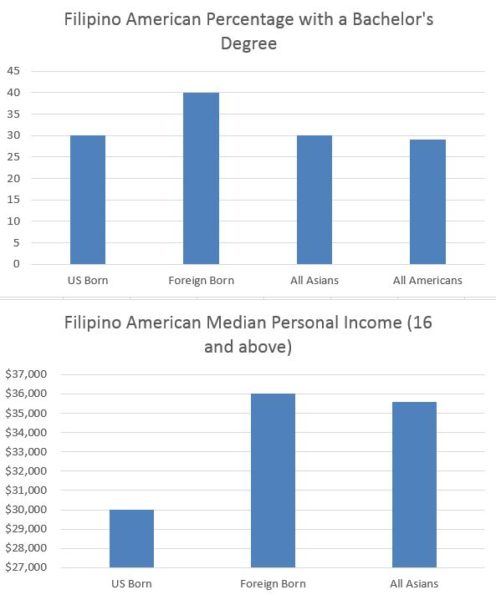After he graduated from high school this year, Number Two Son mentioned to me that one conversation he has continually had with a close Filipino American friend regards how few of their Filipino American peers were ambitious with their college choices. Their levels of achievement and college choices seemed much low, especially compared to other Asian American students at their Silicon Valley high school and despite that many of their parents were well educated. While I personally could see some examples, without real data, it was hard to say whether the kids he saw were just cherry picked examples within a self-selected group in an area heavily obsessed with education. A Pew Research Center compilation of Asian American data shows that Filipino Americans are indeed downward mobile from the initial immigrant generation (data shown above). This compilation should be useful to people who want to make data driven conclusions about Asian Americans.
The Pew Research Center has conveniently disaggregated data nicely into specific facts sheets for specific Asian American groups. A blog post looked at the aggregate data, and some of the findings surprised me – there are more than 20 million of us now and growing. Other interesting facts – Asian Americans are 11.3% of illegal immigrants, with the top country of origin being India (not what I expected). Asian Americans live in a multi-generational household more frequently than the general population (been there).
The data that shows that Filipino Americans are downward mobile doesn’t explain WHY that is the case. I looked up some work in that area and found Susan S. Kim’s Ph.D thesis comparing Korean American and Filipino American youth. The thesis concludes that Korean American communities have education institutions that encourage and support education much more heavily, and that the rapid acculturation that Filipino Americans experience, especially given the colonial history of the Philippines, doesn’t necessarily contribute to better performance. This makes a lot of sense to me. Also, I find that Filipinos, like many Americans, buy into the myth that academic performance in things like math is much more from innate abilities rather than hard work. “Such bullshit!” is Number Two Son’s comment on that myth.
While I find disaggregated data to be very useful, others find the mandated collection of disaggregated data to be objectionable. Other studies looking at Filipino American downward mobility are here and here (focusing on San Diego), and Susan Kim’s thesis contains many more references.









